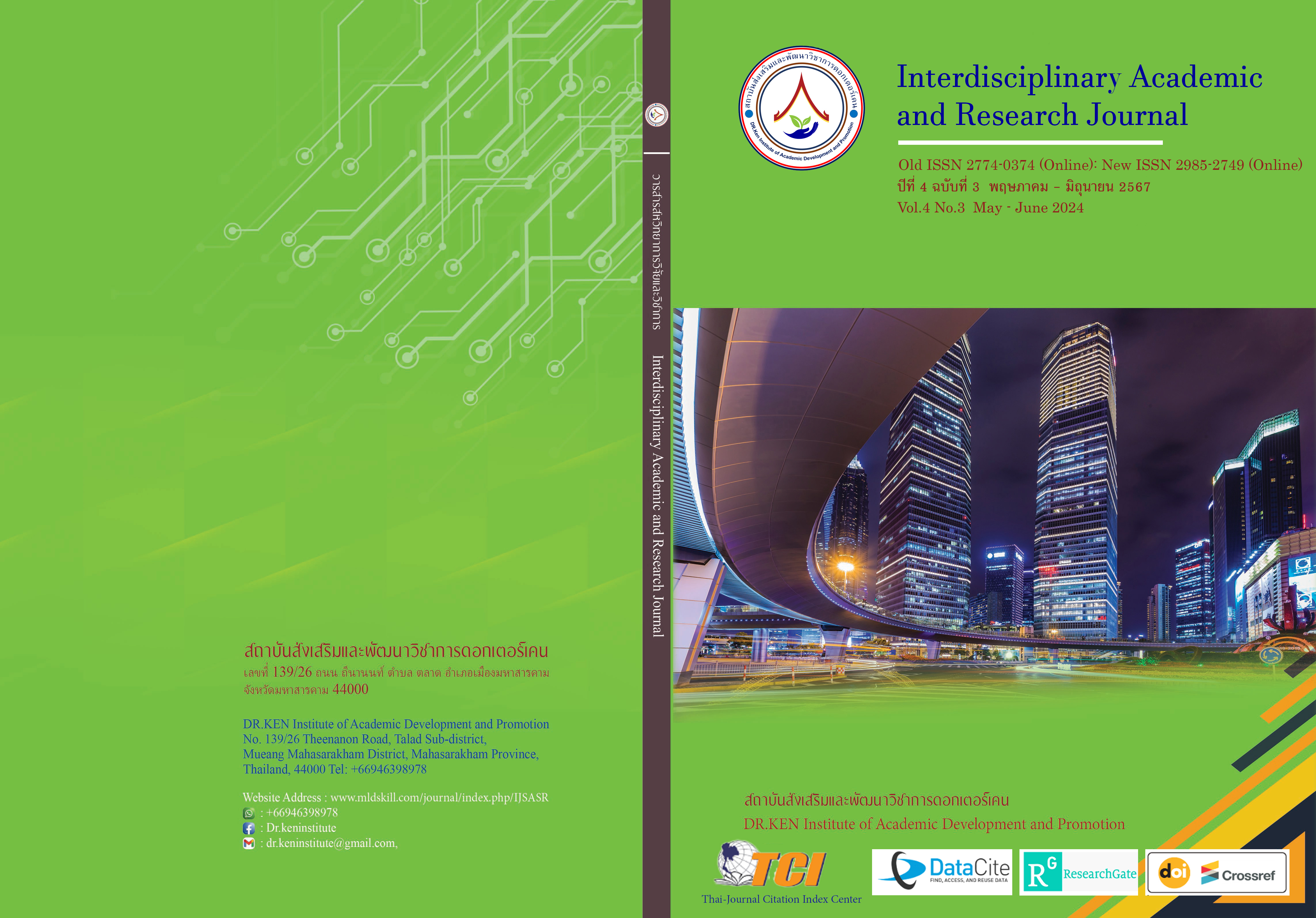A Study of the New Normal Educational Management Skills of School Administrators under the Secondary Educational Service Area Office Kalasin
DOI:
https://doi.org/10.60027/iarj.2024.275376Keywords:
Educational Management Skills; , New Normal EraAbstract
Background and Aims: Arranging education to fit the new normal period has increased the importance of technology and creativity in the classroom. Since many educators have become accustomed to working remotely using technology, there has been a shift in how teachers and students behave when utilizing it for distance learning, and using technology for learning has become the new standard. ensuring that every learner receives the most benefit from their education. Thus, this research aims to 1) study the components of educational management skills in the new normal era of school administrators, 2) study the level of educational management skills in the new normal era of school administrators, 3) compare the level of educational management skills in the new normal era of school administrators under the Kalasin Secondary Education Area Office classified by school size, and 4) compare the level of educational management skills in the new normal era of school administrators under the Kalasin Secondary Education Area Office classified by management experience.
Methodology: The research study is divided into 2 consecutive phases: Phase 1 attended by qualified nine key informants was obtained by specific selection. The instruments used in the research were structured interviews 9 expert qualified informants were obtained by purposive sampling. The instrument was the interview was used to collect the complete details of information. Phase 2, where the population of this research was 55 administrators under the secondary educational service area office Kalasin. The instrument was a questionnaire. Data were analyzed using percentage, mean, and standard deviation.
Results: (1) The new normal educational management skills for school administrators consists of 6 skills: 1) effective communication skills, 2) skills for building sustainable community relationships, 3) creative thinking and problem-solving skills, 4) skills in using technology, digital media, and management innovation. 5) skills in emotional intelligence and a positive attitude, and 6) English language skills. (2) The new normal educational management skills of school administrators overall were at the highest level. (3) The comparison of new normal educational management skills of school administrators classified by school size was the difference. And (4) The comparison of new normal educational management skills of school administrators classified by management experience was the difference.
Conclusion: the field of educational administration has changed to emphasize a diverse set of abilities necessary for surviving the "new normal." In addition to adjusting to variations in school size and management experience, administrators need to possess exceptional communication, technological, and emotional intelligence skills. This sophisticated knowledge highlights the necessity of customized approaches to address the various demands of educational leadership in the fast-paced world of today.
References
กระทรวงศึกษาธิการ. (2565). นโยบายและจุดเน้นของกระทรวงศึกษาธิการ ประจำปีงบประมาณ พ.ศ. 2567. Retrieved on 10 February 2024 from https://moe360.blog/2023/01/04/policy-and-focus-moe-fiscal-year-2024/
โชษิตา ศิริมั่น. (2564). ทักษะการบริหารสถานศึกษาของผู้บริหารในภาวะวิกฤติโควิด-19 ของสถานศึกษาในสังกัดสำนักงานเขตพื้นที่การศึกษามัธยมศึกษา เขต 31. การประชุมวิชาการระดับชาติ วิทยาลัยนครราชสีมา (ภาคโปสเตอร์), 407-416. 27 มีนาคม 2564, วิทยาลัยนครราชสีมา.
ดวงใจ หงส์จันทร์. (2564). จังหวัดกาฬสินธุ์ คุมเข้มปิดโรงเรียนทุกแห่ง สอนออนไลน์แทนจนถึง 14 มกราคม 65. Retrieved on 25 December 2023 from: https://kalasin.prd.go.th/th/content/category/ detail/id/33/iid/66383
ทองทิพภา วิริยะพันธุ์. (2550). ทักษะผู้บริหาร. กรุงเทพฯ : จี. พี. ไซเบอร์พริ้นท์.
นิภาธร มุลกุณี. (2561). การพัฒนาทักษะการบริหารของผู้บริหารสถานศึกษาในสังกัดส านักงานเขตพื้นที่การศึกษา มัธยมศึกษาเขต 1 กรุงเทพมหานคร ในยุคไทยแลนด์ 4.0. ปริญญานิพนธ์หลักสูตรการศึกษามหาบัณฑิต สาขาวิชาการบริหารและการจัดการการศึกษา: มหาวิทยาลัยศรีนครินทรวิโรฒ
นิภาพร รอดไพบูลย์. (2565). ทักษะการบริหารในศตวรรษที่ 21 ของผู้บริหารสถานศึกษา สังกัดสำนักงานเขตพื้นที่การศึกษามัธยมศึกษาสระแก้ว. ปริญญามหาบัณฑิต : มหาวิทยาลัยบูรพา.
บุญส่ง กรุงชาลี. (2561). ทักษะการบริหารในศตวรรษที่ 21 ของผู้บริหารสถานศึกษาขั้นพื้นฐาน สังกัดสำนักงานเขตพื้นที่การศึกษาประถมศึกษาสุรินทร์ เขต 3. ปริญญามหาบัณฑิต : มหาวิทยาลัยราชภัฏบุรีรัมย์.
ปรียาพร วงศ์อนุตรโรจน์. (2546). การบริหารงานวิชาการ. กรุงเทพมหานคร : ศูนย์สื่อเสริมกรุงเทพฯ.
พัชราภรณ์ ดวงชื่น. (2563). การบริหารจัดการศึกษารับความปกติใหม่หลังวิกฤตโควิด – 19. วารสารศิลปการจัดการ, 4(3), 783-795.
แพรดาว สนองผัน. (2557). ทักษะของผู้บริหารสถานศึกษาในศตวรรษที่ 21 สังกัดสำนักงานเขตพื้นที่การศึกษาประถมศึกษาอุดรธานี เขต 3. ปริญญามหาบัณฑิต : มหาวิทยาลัยขอนแก่น.
มณฑาทิพย์ นามนุ. (2561). ทักษะของผู้บริหารสถานศึกษาในศตวรรษที่ 21 สังกัดสำนักงานเขตพื้นที่การศึกษาประถมศึกษาปทุมธานี เขต 2. ปริญญามหาบัณฑิต : มหาวิทยาลัยเทคโนโลยีราชมงคลธัญบุรี.
มาลี บุญศิริพันธ์. (2563). ราชบัณฑิตยสภาบัญญัติศัพท์คำใหม่ “New Normal” ความปรกติใหม่ที่เกิดขึ้นจาก COVID-19. Retrieved on 11 June 2021 from: http://omnirecipes.com/2020/05/07/new-normal/
วัสสิกา รุมาคม. (2565). การบริหารสถานศึกษาในยุคความปกติใหม่หลังวิกฤตโควิด-19. วารสารมหาจุฬา-นาครทรรศน์, 9(6), 16-30.
วิชัย วงใหญ่ และมารุต พัฒผล. (2563). การประเมินการเรียนรู้ใน New normal. กรุงเทพมหานคร: บัณฑิตวิทยาลัยมหาวิทยาลัยศรีนครินทรวิโรฒ.
สำนักงานการศึกษาขั้นพื้นฐาน. (2564). สพฐ. แจงเลือกวิธีเรียนได้หลายแบบหากไม่พร้อมเรียนออนไลน์. Retrieved on 11 June 2021 from https://www.obec.go.th/archives/ 377135.
สุฑาทิพย์ มณีรัตนเลิศวานิช. (2562). ความฉลาดทางอารมณ์ของผู้บริหารที่ส่งผลต่อการสื่อสารภายในสถานศึกษา สังกัดสำนักงานเขตพื้นที่การศึกษาประถมศึกษาราชบุรี เขต 1. วารสารสังคมศาสตร์วิจัย, 10(2), 99-112.
สุนทร โคตรบรรเทา. (2551). หลักการและทฤษฎีการบริหารการศึกษา. กรุงเทพมหานคร : ปัญญาชน.
สุวิมล มธุรส (2564). การจัดการศึกษาในระบบออนไลน์ในยุค NEW NORMAL COVID-19. วารสารรัชต์ภาคย์. 15(40), 33 – 42.
Bellanca, J., & Brandt, R. (Eds.). (2021). Handbook for Smart School Leaders: Survival Strategies for the Toughest Challenges of School Leadership. Taylor & Francis.
Ferdig, R.E., Baumgartner, E., Hartshorne, R., Kaplan-Rakowski, R., & Mouza, C. (Eds.). (2020). Teaching, Technology, and Teacher Education during the COVID-19 Pandemic: Stories from the Field. Association for the Advancement of Computing in Education (AACE).
Fink, D., & Wamsley, G. (2020). Leading the New Normal: Perspectives on Education Leadership During the COVID-19 Pandemic. Routledge.
Halverson, R., & Poole, A. (Eds.). (2020). Handbook of Education Policy Studies. Springer.
UNESCO. (2020). COVID-19 Educational Disruption and Response. UNESCO.
Downloads
Published
How to Cite
Issue
Section
License
Copyright (c) 2024 Interdisciplinary Academic and Research Journal

This work is licensed under a Creative Commons Attribution-NonCommercial-NoDerivatives 4.0 International License.
Copyright on any article in the Interdisciplinary Academic and Research Journal is retained by the author(s) under the under the Creative Commons Attribution-NonCommercial-NoDerivatives 4.0 International License. Permission to use text, content, images, etc. of publication. Any user to read, download, copy, distribute, print, search, or link to the full texts of articles, crawl them for indexing, pass them as data to software, or use them for any other lawful purpose. But do not use it for commercial use or with the intent to benefit any business.
















.png)


